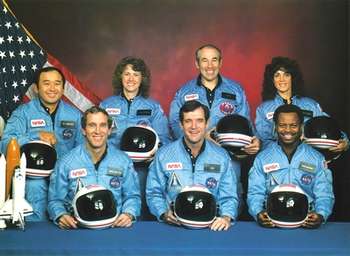
Tragedy in Space
by Sylvia Engdahl
February 1, 2003: Exactly 17 years ago today I wrote an online editorial about the loss of Challenger. It is equally applicable to today's tragic loss of Columbia. The comments with which I preceded it when I first posted it at this site are also all too relevant. So I have nothing to add, except to pay tribute specifically to Columbia's heroic crew, whose names now join the ranks of those who have given their lives for the future welfare of all humanity.Introduction, 2001
This was my reaction to the Challenger tragedy, first published February 1, 1986 in Participate(R) on The Source, a non-Internet conferencing system that preceded the Web. At that time I was one of its volunteer moderators and on the staff of its weekly online magazine Chimo, and I posted this as an editorial. Now, coming across it in my files 15 years later, it still seems worth posting. Someday--I trust not in the near future--it's bound to become timely again.Sooner or later, if we migrate into space others will die there. And I am not sure that the widespread attitude toward this inescapable fact is any more realistic than it was in 1986. Death on the highway, in the air, and on mountaintops is viewed as tragic, yet hardly as grounds for abandoning cars, planes, or dangerous sports. Death in space alone has been perceived by the public as a peril that shouldn't be allowed to exist. We won't become a spacefaring species until we realize that in venturing beyond our planet, we will not leave behind any of the natural consequences of being human--of which our mortality is indisputably the most certain.
The First Death
(Posted online February 1, 1986)
It has come and gone: the day I've been dreading for the past quarter-century. The day that had to arrive sometime, yet that I, like everyone else, had hoped could be put off forever. I knew, as everyone knows, that the world isn't like that, or more properly speaking, that the universe isn't. No human endeavor is free of tragedy. Still we are all stunned, horror-stricken, when tragedy comes.It has long been my conviction that expansion into space is a natural and essential step in human evolution. I believe our species can't survive without moving beyond our native planet, and in this I differ from many who believe merely that making discoveries about the universe is a good thing to do.
But we can't move into space without the support of the public, and a large share of the public doesn't view the space program as necessary to human survival. So inevitably, I worried far in advance about the public effect of a space disaster.
The astronauts worried, too. They have all known the risk, and many have made statements that if anything should happen, the program must go on. After all, nobody would ride a rocket of incredible explosive potential into orbit without confidence that, in the words of Virgil Grissom who died in the Apollo ground test fire, "The conquest of space is worth the risk of life."
But the public doesn't acknowledge this risk as astronauts do. That has always puzzled me. Why is it different from the widely accepted risks of aviation, a field that cost countless lives in its early years and is still subject to frequent well-publicized disasters? We had 25 years of space flight, 55 American missions in a row without a single in-flight fatality; this was an almost miraculous record. Statistically we were overdue for an accident. Why should it have been felt that space travel, unlike any other pioneering venture in human history, would be blessed forever with freedom from everyday harsh reality?
Today I came upon what I think may be the answer in a beautifully written piece posted to a local electronic bulletin board. The writer suggested that to many people space wasn't part of reality. "They seem to think that, like a television show with good guys and bad guys, everything will come out well in the end and good will always triumph over evil," she wrote. "They reacted with shock and horror, perhaps partly because the space program `wasn't real to them. After all, the good guys always survive."
 Is this true? Is what we do in space no more real to the American public
than Star Trek? I like Star Trek and other space fiction because I think
it says something, albeit not very literally, about the real future. Did
others like real space launches because they seemed to turn life into a
fantasy world?
Is this true? Is what we do in space no more real to the American public
than Star Trek? I like Star Trek and other space fiction because I think
it says something, albeit not very literally, about the real future. Did
others like real space launches because they seemed to turn life into a
fantasy world?We are no longer in the fantasy world. We are all aware now that every step of human advancement has its price. And yet we really should not think of tragedy as a price, as if there were a choice about paying it; for death is inherent in the human condition. We are all going to die, and personally I'd feel privileged to die in space rather than in some futile way on the ground. Most of us, underneath, would prefer to die. for a cause; and the cause of my choice, if I were offered a choice, would be space humanization.
Space humanization [a term current when this was written] -- the very words imply that space is the frontier for all aspects of human existence. One by one, we've watched the "firsts": first man in orbit, first spacewalk, first moon landing, first woman in space, first black, first private citizen ... and now the first death. Where humans go, death must go also; has anyone ever really. doubted that?
The names of the Challenger Seven will be forever enshrined among our most honored "firsts." Perhaps their greatest legacy to us will be a new perception that advancement into space is not a game or a show, but real.
If this perception prevails, then the next space milestone of equal
significance will be the first birth.
Postscript, 2017
At the time of the Challenger disaster I was astonished by the widespread public feeling that it meant space travel shouldn’t be undertaken, and especially that the civilian teacher Christa McAuliffe shouldn’t have been “sent” into space, as if she hadn’t been chosen out of thousands of applicants who vied for the chance to go. The supposition, sometimes even explicitly stated, that she hadn’t known it was dangerous was an insult to both her courage and her intelligence. Who could possibly be unaware that riding in a spacecraft propelled by rocket engines and boosters providing 7.8 million pounds of thrust at liftoff involves risk? As suggested in the essay above, perhaps previous space flights had been viewed if they were fantasy. But I now think there was more to it than that.It would simply not have been rational for anyone ever to think space travel isn’t dangerous; the evidence that it’s unsafe could hardly have come as a surprise. And even if it did, dangers involving far greater numbers of people, such as those of early aviation, had been accepted by the public without question. No one said that pilots shouldn’t be allowed to take off in primitive planes. although the crash rate was extremely high. Planes, however, did not get very far from the ground. There was no possibility that improved ones would leave the planet and enter unknown regions beyond. I suspect that the realization that space travel is real came not with the tragedy of Challenger, but with the Apollo moon flights, and that Challenger brought to the surface unconscious feelings that had been building up for a long time. Underneath, people were troubled not by the danger to the astronauts but by the potential perils of contact with the wider universe. (See my essay Confronting the Universe in the Twenty-First Century, which appeared in The Space Review.) The Challenger disaster was merely the trigger for expression of the public’s growing uneasiness about spacefaring.
But fortunately, we now know (as of 2019) that it's not true that we can't move into space without the support of the public; I was mistaken about that when I wrote "The First Death." Entrepreneurs are on the verge of getting crews there without it, and there is every reason to think that this trend will accelerate. Throughout human history the major advances have been made by individuals whose vision was not shared by the majority of their contemporaries. Why did we ever think it would be different with space exploration?
Copyright 1986, 2001, 2017 by Sylvia Engdahl
All rights reserved.